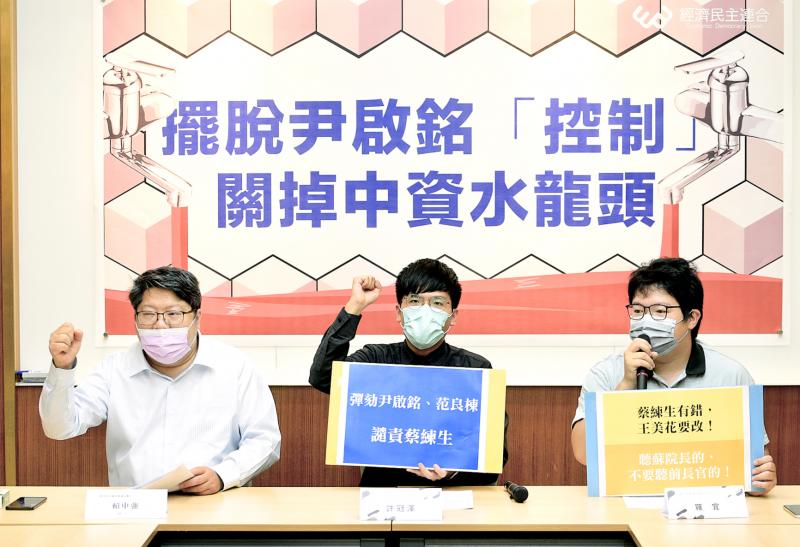Economic officials should ignore the faulty definition of Chinese investment that has led to a “leaky faucet” allowing unmitigated capital into Taiwan, the Economic Democracy Union said yesterday, calling for a Control Yuan investigation into top officials who created the definition.
The problem started in 2009, when the Ministry of Economic Affairs passed the Measures Governing Investment Permits to the People of the Mainland Area (大陸地區人民來台投資許可辦法), union researcher Hsu Kuan-tze (許冠澤) told a news conference at the Legislative Yuan in Taipei.
He said that the measures stipulate investment qualifications that leave loopholes for Chinese investors.

Photo: Peter Lo, Taipei Times
In particular, Article 3 defines a controlling share to be at least 30 percent of an entity, whereas its parent law, the Act Governing Relations Between the People of the Taiwan Area and the Mainland Area (臺灣地區與大陸地區人民關係條例), does not mention either a controlling stake or percentage, Hsu said.
This is the reason Chinese investors can now “play the numbers game” to channel funds into Taiwan, and differs from the parent law’s criterion of having “significant influence” to determine whether an investment should be regulated, Hsu said.
Introducing the “controlling stake” criterion provides Chinese investors with a protective cocoon, he added.
However, if the “significant influence” definition is applied, it could uncover many Chinese investors hiding behind foreign capital, Hsu said, citing for example Tencent Holdings Ltd’s stake in ShopeePay’s parent company, Singapore-based SeaMoney (Payment) TW Private Ltd.
This loophole is the “masterpiece” of then-minister of economic affairs Yiin Chii-ming (尹啟銘), then-Investment Commission executive secretary Fan Liang-tung (范良棟) and Chinese National Federation of Industries secretary-general Tsai Lien-sheng (蔡練生), Hsu said.
The goal was to allow Chinese funds to flow through a “green channel” as much as possible, similar to other foreign investment, while minimizing the scope of the “red channel,” he said.
Because of this definition, illegal Chinese investors are now using multilevel holdings to dilute their investments and circumvent the 30 percent rule, he said.
Yiin, who served as economic minister from 2008 to 2009, is also secretary-general of the Cross-strait CEO Summit, an important part of China’s economic “united front” efforts, union convener Lai Chung-chiang (賴中強) said, adding that Fan and Tsai serve as deputy secretaries-general of the summit.
As such, Minister of Economic Affairs Wang Mei-hua (王美花) is responsible for checking whether the decisions made under their tenure are harmful to the nation, Lai said.
She should heed Premier Su Tseng-chang’s (蘇貞昌) call to “seal the leaky faucet rather than always mopping the floor,” as enforcing the 30 percent rule only distorts the source of Chinese capital, Lai said.

An undersea cable to Penghu County has been severed, the Ministry of Digital Affairs said today, with a Chinese-funded ship suspected of being responsible. It comes just a month after a Chinese ship was suspected of severing an undersea cable north of Keelung Harbor. The National Communications and Cyber Security Center received a report at 3:03am today from Chunghwa Telecom that the No. 3 cable from Taiwan to Penghu was severed 14.7km off the coast of Tainan, the Ministry of Digital Affairs said. The Coast Guard Administration (CGA) upon receiving a report from Chunghwa Telecom began to monitor the Togolese-flagged Hong Tai (宏泰)

A cat named Mikan (蜜柑) has brought in revenue of more than NT$10 million (US$305,390) for the Kaohsiung MRT last year. Mikan, born on April 4, 2020, was a stray cat before being adopted by personnel of Kaohsiung MRT’s Ciaotou Sugar Refinery Station. Mikan was named after a Japanese term for mandarin orange due to his color and because he looks like an orange when curled up. He was named “station master” of Ciaotou Sugar Refinery Station in September 2020, and has since become famous. With Kaohsiung MRT’s branding, along with the release of a set of cultural and creative products, station master Mikan

Actor Lee Wei (李威) was released on bail on Monday after being named as a suspect in the death of a woman whose body was found in the meeting place of a Buddhist group in Taipei’s Daan District (大安) last year, prosecutors said. Lee, 44, was released on NT$300,000 (US$9,148) bail, while his wife, surnamed Chien (簡), was released on NT$150,000 bail after both were summoned to give statements regarding the woman’s death. The home of Lee, who has retreated from the entertainment business in the past few years, was also searched by prosecutors and police earlier on Monday. Lee was questioned three

RISING TOURISM: A survey showed that tourist visits increased by 35 percent last year, while newly created attractions contributed almost half of the growth Changhua County’s Lukang Old Street (鹿港老街) and its surrounding historical area clinched first place among Taiwan’s most successful tourist attractions last year, while no location in eastern Taiwan achieved a spot in the top 20 list, the Tourism Administration said. The listing was created by the Tourism Administration’s Forward-looking Tourism Policy Research office. Last year, the Lukang Old Street and its surrounding area had 17.3 million visitors, more than the 16 million visitors for the Wenhua Road Night Market (文化路夜市) in Chiayi City and 14.5 million visitors at Tainan’s Anping (安平) historical area, it said. The Taipei 101 skyscraper and its environs —